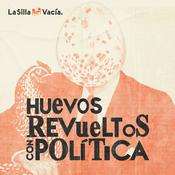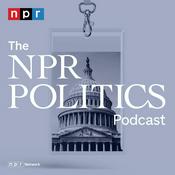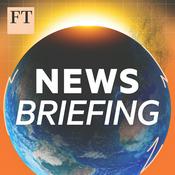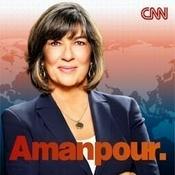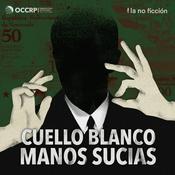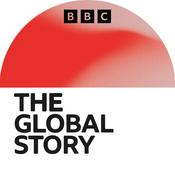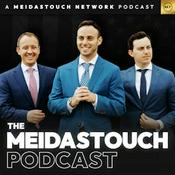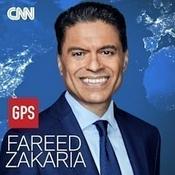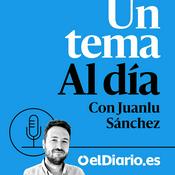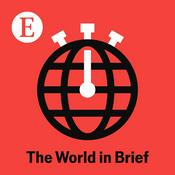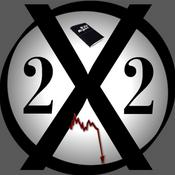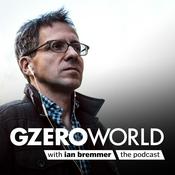23 episodios
What you need to know about immigration and unemployment (w/ Karina Villada & Juan Vargas Alba)
17/12/2025 | 18 minIn the wake of the successful inclusion of a Youth Climate Corps pilot in the 2025 federal budget, Juan Vargas Alba (co-lead of the Youth Climate Corps campaign) interviews community organizer Karina Villada about the myths and scapegoating around immigration, migrant workers and (youth) unemployment.
This episode functions as a resource for young organizers who want to understand issues of immigration and encourages the climate movement to stand in solidarity with the migrant rights movement.
This episode aired on Wednesday, December 17th, 2025.
Credits: Produced by Anjali Appadurai, Juan Vargas Alba and Doug Hamilton-Evans. Hosted by Juan Vargas Alba. Featuring Karina Villada. Music and audio editing by Anjali Appadurai. Artwork by Geoff Smith.Emergency Marker 5: Leave No One Behind (w/ Jim Stanford, Anjali Appadurai & Seth Klein)
03/12/2025 | 1 h 10 minEpisode 5 of this 6-part special series takes on the equity marker: leaving no one behind. Erin Blondeau speaks with economist Jim Stanford, campaigner Anjali Appadurai, and strategist Seth Klein about what just transitions must look like in practice. They explore the realities for fossil fuel workers, the importance of linking climate action to economic fairness, and Canada’s responsibilities globally. Their conversation highlights that climate action succeeds only when it’s grounded in solidarity: supporting workers, expanding public services, addressing inequality, and ensuring that communities most impacted by the crisis are centred in solutions. It’s a reminder that justice isn’t an add-on: it’s the strategy.
Links & references:
The Fair Shares campaign website: www.climatefairshare.ca
Support the Fair Shares platform 350.org/canada/fairshare
Centre for Future Work website: centreforfuturework.ca
The G7 and Canada’s climate fair share - Break in Case of Emergency
Enormous Jobs Potential from Energy Transition Investments - Jim Stanford
Why tackling climate and inequality must go hand-in-hand - Seth Klein
Testimony to the House of Commons Finance Committee about the need for a Just Transition Transfer - Seth Klein
Why aren’t we talking about war taxes? - Seth Klein (video)
More on the 6 Markers of the Climate Emergency:
Watch our video: 6 Markers of Climate Emergency Action
Listen to all 6 episodes of our special series & the 6-marker overview episode from March 2025.
Learn more about the 6 markers at www.davidsuzukiinstitute.ca/6-markers-of-climate-emergency
Credits:
Produced by Erin Blondeau and Doug Hamilton-Evans. Written and hosted by Erin Blondeau. Music by Anjali Appadurai. Audio editing by Blue Light Studios. Artwork by Geoff Smith.- In Episode 3, the series confronts a critical shift: moving from voluntary climate action to mandatory rules that match the scale of the crisis. Erin Blondeau and Seth Klein speak with Dr. Melissa Lem, whose experience as a family physician brings urgency and clarity to the conversation. Reflecting on the deadly 2021 heat dome, they discuss mandatory measures like banning fossil fuel advertising and phasing out gas in new buildings. They also highlight the power of community-led responses and the growing leadership of health professionals calling for decisive action. This episode underscores that voluntary approaches are no match for an emergency.
This episode was recorded on August 26, 2025, when entering forests in Nova Scotia was banned while severe forest fires burned through the province.
Links & references:
Fossil Fuel Ads Make Us Sick - CAPE campaign to ban fossil fuel ads
Reflections on mandates, from COVID to climate - Seth Klein
Like we did for tobacco, we must ban false fossil fuel ads - Seth Klein
Vancouver council's gas plan goes up in smoke after fierce public pushback - Seth Klein
Plugged in or left behind? - Chris Hatch column on zero-emission vehicle mandates
Axing the EVs: Canadian sales plunge while global sales surge - Barry Saxifrage column on the power of vehicle mandates
More on the 6 Markers of the Climate Emergency:
Watch our video: 6 Markers of Climate Emergency Action
Listen to all 6 episodes of our special series & the 6-marker overview episode from March 2025.
Learn more about the 6 markers at www.davidsuzukiinstitute.ca/6-markers-of-climate-emergency
Credits:
Produced by Erin Blondeau and Doug Hamilton-Evans. Written and hosted by Erin Blondeau. Music by Anjali Appadurai. Audio editing by Blue Light Studios. Artwork by Geoff Smith. Emergency Marker 2: Create New Institutions (w/ Alex Himelfarb, Linda McQuaig & Seth Klein)
03/12/2025 | 1 h 13 minIn episode 2 of our 6-marker series, we turn to the institutions we need for an emergency-scale response. Erin Blondeau speaks with Alex Himelfarb, Linda McQuaig, and Seth Klein about why relying on private incentives hasn’t worked, and how Canada once excelled at building bold public institutions. From Connaught Labs to Ontario Hydro, they revisit the legacy of Crown corporations and imagine what new ones could achieve today: from publicly owned renewables to EV manufacturing to national retrofit programs. They also explore the promise of a Youth Climate Corps. It’s a call for imagination, democratic accountability, and rebuilding the public capacity we’ve allowed to erode.
Links & references:
Canada Needs a Youth Climate Corps - Climate Emergency Unit (video)
Learn more about the Youth Climate Corps campaign
The Sport and Prey of Capitalists - Linda McQuaig
Breaking Free of Neoliberalism: Canada’s Challenge - Alex Himelfarb
More on the 6 Markers of the Climate Emergency:
Watch our video: 6 Markers of Climate Emergency Action
Listen to all 6 episodes of our special series & the 6-marker overview episode from March 2025.
Learn more about the 6 markers at www.davidsuzukiinstitute.ca/6-markers-of-climate-emergency
Credits:
Produced by Erin Blondeau and Doug Hamilton-Evans. Written and hosted by Erin Blondeau. Music by Anjali Appadurai. Audio editing by Blue Light Studios. Artwork by Geoff Smith.- Episode 4 turns to one of the most foundational markers of emergency leadership: telling the truth. Host Erin Blondeau brings together Donya Ziaee, Chris Hatch, and Seth Klein to examine why honest, urgent communication is essential in a crisis, and why Canada isn’t getting it. They dig into the failures of mainstream media, the rise of independent outlets, and the influence of fossil fuel advertising. The conversation makes the case for clear, evidence-based reporting that includes context, solutions, and a sense of agency, not doom. Truth-telling, they argue, is what allows societies to mobilize, and what’s been missing for far too long.
Links & references:
Zero Carbon - Weekly climate newsletter by Chris Hatch
Dissecting the climate denial machine: culture wars and the climate countermovement - Break in Case of Emergency
Mapping right-wing activism, corporate lobbying and climate denialism - Break in Case of Emergency
Fossil Fuel Ads Make Us Sick - CAPE campaign
Quiet Alarm: A Review of the CBC’s Climate Reporting - Report led by SFU's Community-Engaged Research Initiative (CERi) and CEU
CBC must strengthen its case on climate for our (and its own) survival - Seth Klein (video)
CBC must strengthen its case on climate for our (and its own) survival - Seth Klein (column)
Crisis, what crisis? We need a climate emergency information agency - Seth Klein
Is Suzuki right that it's 'too late'? We are in an era of simultaneous wins and losses - Seth Klein
The climate movement must shift gears or it's done - Seth Klein
What do Canadians really think about climate change?: A summary of public opinion research for communicators - Re.Climate
More on the 6 Markers of the Climate Emergency:
Watch our video: 6 Markers of Climate Emergency Action
Listen to all 6 episodes of our special series & the 6-marker overview episode from March 2025.
Learn more about the 6 markers at www.davidsuzukiinstitute.ca/6-markers-of-climate-emergency
Credits:
Produced by Erin Blondeau and Doug Hamilton-Evans. Written and hosted by Erin Blondeau. Music by Anjali Appadurai. Audio editing by Blue Light Studios. Artwork by Geoff Smith.
Más podcasts de Noticias
Podcasts a la moda de Noticias
Acerca de Break In Case of Emergency
A Canadian podcast about audacious climate solutions rooted in justice and workers’ rights — from the team at the Climate Emergency Unit.
Sitio web del podcastEscucha Break In Case of Emergency, CNN 5 Cosas y muchos más podcasts de todo el mundo con la aplicación de radio.net
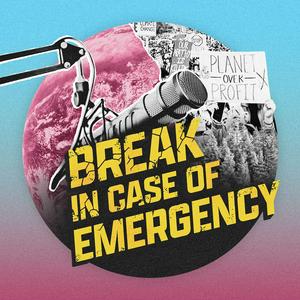
Descarga la app gratuita: radio.net
- Añadir radios y podcasts a favoritos
- Transmisión por Wi-Fi y Bluetooth
- Carplay & Android Auto compatible
- Muchas otras funciones de la app
Descarga la app gratuita: radio.net
- Añadir radios y podcasts a favoritos
- Transmisión por Wi-Fi y Bluetooth
- Carplay & Android Auto compatible
- Muchas otras funciones de la app


Break In Case of Emergency
Escanea el código,
Descarga la app,
Escucha.
Descarga la app,
Escucha.


